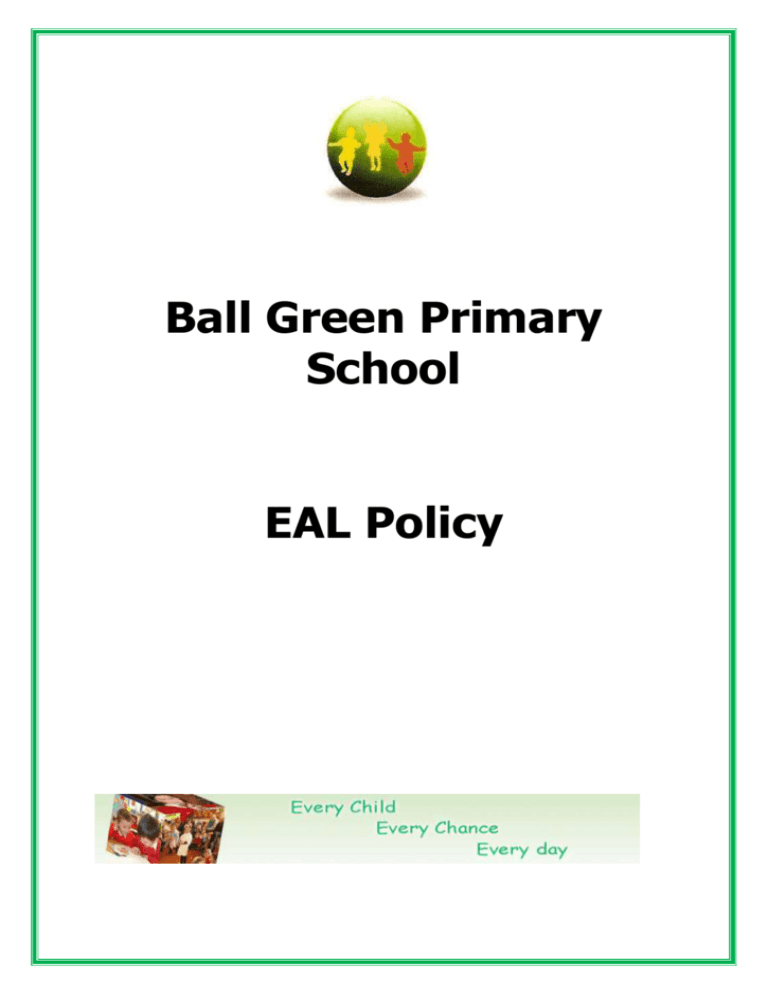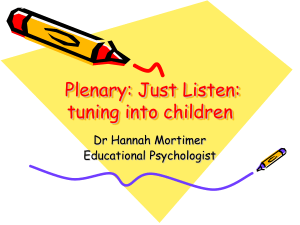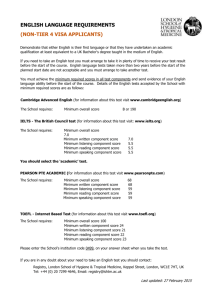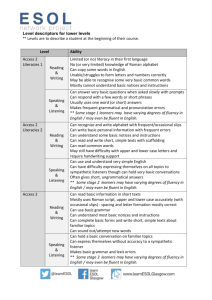EAL Policy - Ball Green Primary School
advertisement

Ball Green Primary School EAL Policy In our school the teaching and learning achievement, attitudes and well-being of all our children are important. We encourage all our children to achieve the highest possible standards. We do this through taking account of each child’s life experiences and needs. A number of our children have particular learning and assessment requirements, which are linked to their progress in learning English as an additional language. Children who are learning English as an additional language have skills and knowledge about language similar to monolingual English-speaking children. Their ability to participate in the full curriculum may be in advance of their communicative skills in English. Aims and Objectives The National Curriculum secures entitlement for all children to a number of areas of learning and gives them the opportunity to develop the knowledge, understanding, skills and attitudes that are necessary for their self-fulfilment and development as responsible citizens. We promote the principles of fairness andjustice for all through the education that we provide in our school. We aim: • To improve the speaking and listening, reading and writing of English of children who are learning English as an additional language • To provide newly arrived pupils with a safe welcoming environment • To gather accurate information about pupils’ backgrounds and educational experiences • To use School, County and Government resources effectively to raise the attainment of children for whom English is an additional language • To identify and make maximum use of opportunities for modelling fluent use of English and to provide opportunities for children to practise and extend their use of English. • To encourage and enable parental support in improving children's attainment • To ensure that children can see their languages, culture and identity reflected in their classrooms and the wider school The aim of this policy is to help ensure that we meet the full range of needs for those children who are learning English as an additional language. This is in line with the requirements of the Race Relations Act 1976. Teaching and learning styles In our school teachers take action to help children who are learning English as an additional language by various means: Developing their spoken and written English by: • Ensuring that vocabulary work covers the technical as well as the everyday meaning of key words • Explaining how speaking and writing in English are structured for different purposes across the range of subjects • Providing a range of reading materials that highlight the different ways in which English is used • Ensuring that there are effective opportunities for talking, that talking in used in support of writing • Encouraging children to transfer their knowledge, skills and understanding of one language to another • Building on children’s experiences of language at home and in the wider community, so that their developing uses of English and other languages support one another. Ensuring access to the curriculum and to assessment by: • Using accessible texts and materials that suit children’s ages and levels of learning; • Providing support through ICT, video or audio materials, dictionaries and translators, readers and amanuenses; • Using the home or first language where appropriate. Curriculum Access All children in our school follow the curricular requirements of the Foundation Stage, and National Curriculum. Children with English as an additional language do not produce separate work. Where appropriate we occasionally withdraw some children from lessons to receive EAL support as part of our Wave 2 provision. The Foundation Stage helps children learning English as an additional language by: • Building on children’s experiences of language at home and in the wider community, so that their developing uses of English and of other languages support one another • Providing a range of opportunities for children to engage in speaking and listening activities in English with peers and adults • Providing a variety of visual resources (ie calendar, numbers) in the children’s home language as well as in English Roles and Responsibilities: All staff have responsibility for supporting and encouraging children to become fluent English speakers by: • Modelling good use of English, in extending sentences and encouraging children to do the same • Communicating to children that they are expected to speak clearly and audibly using more than single words as appropriate • Communicating to children that they are expected to listen and respond when someone speaks to them All teachers have responsibility for: • Planning work in the context of children's stage of fluency and anticipating opportunities for developing use of English • Setting targets (where appropriate) for improving speaking and listening, reading and writing • Assessing and tracking progress in speaking and listening, reading and writing The Inclusion Leader has responsibility for: • Identifying and providing resources which support children learning English as an additional language • Updating speaking and listening, reading and writing assessments each term in partnership with class teachers • Supporting staff to communicate effectively with parents using translators where appropriate • Organising translations of important information to be shared with parents This policy will be reviewed in September 2016







